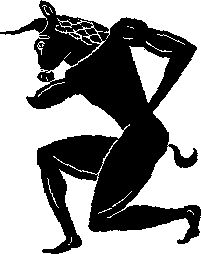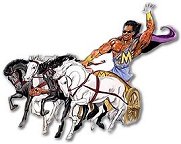|
PAGE ONE
Theseus was a king
of Athens famous for many exploits, and appearing in works by
many authors and on countless vases, art and statues. There is
some confusion about Theseus' parentage - some say he is the son
of Aegeus and Aethra, and others the son of Poseidon and Aethra.
The ancient Greek writers Apollodoros and Hyginus say Aethra
waded out to Sphairia after sleeping with Aegeus, and lay there
with Poseidon.
The next day, Aegeus, who had been visiting Aethra at Troizen,
left for his home city of Athens. As he left, he left sandals
and a sword under a large rock; should Aethra bear a male child,
she was to send him to Athens to claim his birthright as soon as
he was old enough to lift the rock and retrieve the items.
Aethra gave birth to Theseus, who came of age and set off for
Athens with the sword and sandals, encountering and defeating
six murderous adversaries along the way. When Theseus reached
Athens, Medea, the wife of Aegeus, persuaded Aegeus to kill the
as of yet unrecognized Theseus by having him attempt to capture
the savage Marathonian Bull. Theseus does the unexpected and
succeeds, so Medea tells Aegeus to give him poisoned wine.
Aegeus recognizes Theseus' sword as he is about to drink and
knocks the goblet from his lips at the last second.
According to Plutarch and Philochoros, on the way to Marathon to
kill the bull, Theseus encounters a fierce storm and seeks
shelter in the hut of an old woman named Hecale. She promises to
make a sacrifice to Zeus if Theseus comes back successful. He
comes back, finds her dead, and builds a deme in her name. Some
time after Theseus return to Athens, trouble stirs and blood
flows between the houses of Aegeus in Athens and Minos, his
brother in Crete.
War and drought ensues and an oracle demands that recompense be
made to Minos. Minos demands that seven maidens and seven youths
are to be sacrificed to the Minotaur every nine years. Theseus
is among the chosen victims and sails off to Crete, promising to
Aegeus that his ship's black flag would be replaced with a white
flag if Theseus is victorious. In Crete, Minos molests one of
the maidens and Theseus becomes angry and challenges him,
boasting of his parentage by Poseidon. Minos, son of Zeus is
amused and asks Theseus to prove his heritage by retrieving a
ring from the depths of the ocean. Theseus being a son of
Poseidon succeeds.
Ariadne, a young woman in Crete already betrothed to Dionysus,
falls in love with Theseus and helps him defeat the Minotaur.
Ariadne then leaves Crete with Theseus, who abandons her on Dia
(at Athena's behest, according to Pherekydes).
In returning to Athens Theseus forgets to switch the black sail
with the white one. Aegeus, consequently, watching from afar
believes his son is dead and hurls himself into the sea, named
the 'Aegean' after him. After Aegeus' death, Theseus must
contend against Pallas for the throne. Theseus gets wind of a
planned assassination against him and spoils the ambush, killing
Pallas and gaining the throne.
Theseus and a good friend of his by the name of Pirithous want
to marry daughters of Zeus, and begin their quest by abducting
Helen. Theseus wins a bet and gets Helen, but must accompany
Pirithous to Hades to recover Persephone for him. There is much
disagreement here about what happens in Hades, but many
traditions say only Theseus makes it back out.
Theseus does two noteworthy patriotic acts to Thebes, accepting
Oedipus at Kolonus, and helping Adrastos bury the Seven, fallen
in the struggle for the throne of Thebes. Late in his life
Theseus loses popularity in Athens and is exiled. He wanders to
Scyrus where he is hurled off a cliff by Lycodemes.
THE STORY OF THESEUS BY
OVID
Theseus was a great
hero from Athens who was the son of the Greek king, Aegeus.
Theseus did not grow up with his father, but in fact his mother
in southern Greece. King Aegeus left Theseus with his mother
before the child was born. He left a sword and a pair of shoes
in a hollow under a stone. King Aegeus said that if Theseus,
when he was old and strong enough, could roll the stone away,
then Theseus could travel to Athens to claim himself as the son
of the king. Theseus, at a young age, accomplished this feat and
his mother told him what to do.
His grandfather left a ship for him to use to travel to Athens,
but Theseus declined the offer, saying that it would be too easy
for him. Theseus decided that it would be better to travel by
land because he felt that he wanted to become a great hero at a
young age and he believed that the safety of a ship was not the
way to go about this. Theseus wanted to become as great a hero
as the famous Hercules, and Theseus always had Hercules in his
mind, trying to become as great a hero as Hercules. This was
quite natural considering that Hercules and Theseus were
cousins.
So Theseus made the trek by land. It would be a long and
dangerous journey because there were many bandits that roamed
the countryside. To achieve the greatness that Theseus believed
he should achieve, he killed every bandit on the way to Athens.
Theseus' form of justice was very effective: he believed that
what each of the bandits had done to others, Theseus must do to
the bandits.
An example of this occurred when Theseus met Sinis, a man famous
for killing people by strapping people to the trunks of two pine
trees that were bent to the ground. Sinis would then let the
trees stand straight again, thus hurling the victim that was
strapped to the trees through the air to their death. Theseus
knew about this, and he killed Sinis by this method.
There were many other bandits that were killed by Theseus and he
killed them using the same method that each bandit used to kill
their victims. When Theseus arrived in Athens, he was praised by
the people for his help to kill the bandits in the country. The
king invited him to the palace, not knowing that Theseus was his
son. In fact, the king was frightened that since Theseus was so
popular with the people that they might make Theseus the king.
So, King Aegeus invited Theseus to dinner with the intention of
poisoning him. This was not a plan of his, but a plan that Medea
had thought up.
Medea was the heroine of the Quest of the Golden Fleece who fled
from Corinth to Athens in her flying chariot. She had obtained a
great influence over King Aegeus and didn't want to have that
changed if a son appeared in the life of the king. Theseus was
invited to a splendid dinner with the king. During the dinner as
Medea handed the poisoned cup to Theseus, Theseus drew his sword
to reveal his identity to the king. As soon as the king caught
sight of the sword, he instantly recognized his son and threw
the poisoned cup to the ground. Medea, as she always did, fled
without a trace to Asia. Soon after, King Aegeus proclaimed that
Theseus was his son and heir. This gave Theseus the opportunity
to endear himself to the people of Athens.
Years before the arrival of Theseus to Athens, a terrible
misfortune happened to the city. Minos, the ruler of Crete, lost
his only son, Androgeus, while visiting King Aegeus in Athens.
Aegeus sent Androgeus on a dangerous expedition, to kill a bull.
This is something that a host should never do. As a result,
Androgeus was killed by the bull. Minos invaded the country of
Greece to avenge his son's death. He captured the country and
threatened to demolish it unless King Aegeus sent seven maidens
and seven youths to Crete every nine years. When the 14
Athenians arrived in Crete, they were given to the Minotaur to
devour. The Minotaur was a creature that was half bull, half
human which was the offspring of Minos' wife, Pasiphaë, and a
beautiful bull. Poseidon had given the bull to Minos with the
assumption that Minos would sacrifice it to Poseidon but Minos
could not bear to kill the bull, so he kept it for himself.
Poseidon decided that Minos should be punished, so he made
Pasiphaë fall in love with the bull.
THESEUS
CONTINUES ON PAGE TWO

THESEUS
CONTINUES ON PAGE TWO

BACK HOME

|







